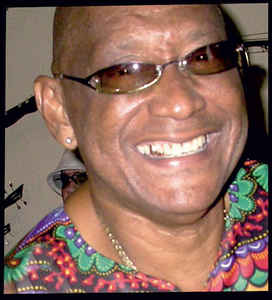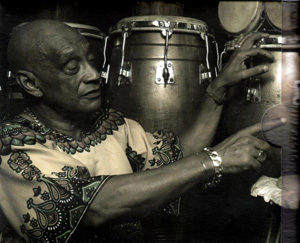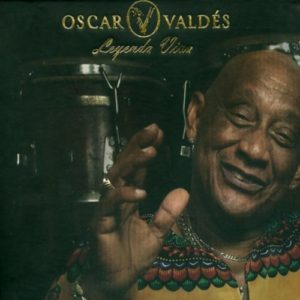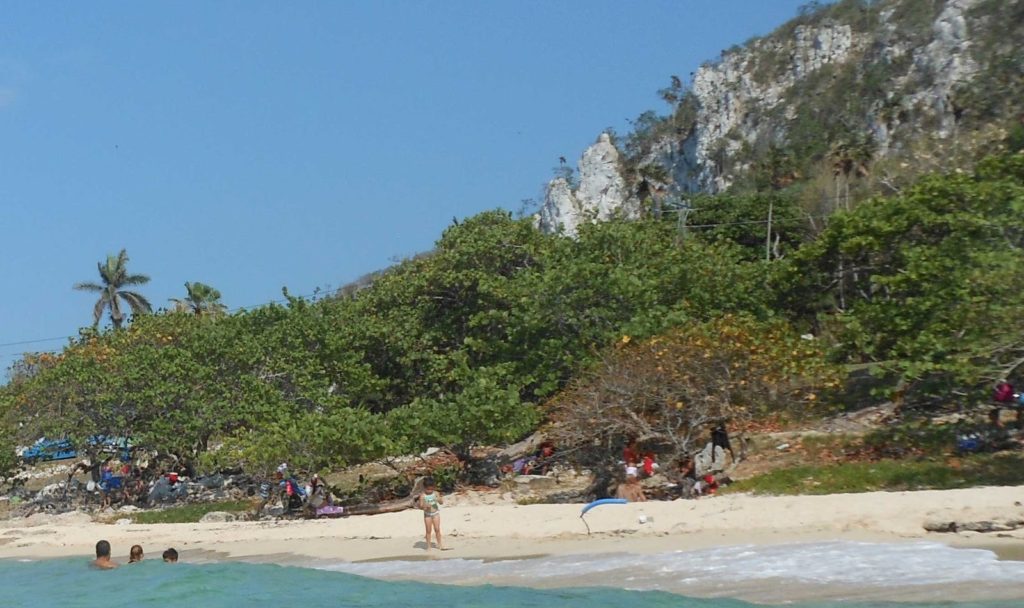Oscar Valdés (son). Percussionist and vocalist, joined the folk group Irakere under the direction of Chucho Valdés and being a member of this won the first Grammy Award.
Oscar Valdés, from small felt vocation for music, because it was part of a remarkable family of musicians, which include his father Oscar Valdés (father) (percussionist); his uncles Marcelino Valdés (percussionist), Alfredo Valdés and Vicentico Valdés, (singers).
He worked in the orchestras of CMQ, ICRT, Benny More, Orquesta Cubana de Musica Moderna. He was singer and percussionist of the Group Irakere, which achieved a recognized work, and subsequently formed a group, which worked at the end of the 90’s and beginning of the 21ST century.
OSCA Valdes Jr. started in music to 1949, with a batalero called Fermin, who was who taught him drums curfews bata, the construction of the abakuá drum, the bata and the beats; then studied with Guillermo Barreto and Salvador Admiral (father), and Conservatorio Alejandro Garcia Caturla, timpani.
At the cabaret Montmartre, where played his father Oscar Valdés with the Orchestra of Bebo Valdés, heard the rhythm batacun gown, Orestes López (hand); in the campaign, Princess and mangroves, with the orquesta típica de Antúnez, began to make the fallback when missing tumbador or the timbalero.
After 1959, she was part of the band and the rebel army’s choir, worked with the Group of Chucho Valdés, Leo Brouwer and Manuel Duchesne Cuzán in the ICAIC, until in 1967 he passed to the Orquesta Cubana de Musica Moderna, directed by Armando Romeu and Rafael Somavilla.
In 1972, founded the Group Irakere, under the direction of Chucho Valdés, he joined its payroll as a percussionist and singer. His work with this group was to make the letters, and the ideas of the Group ritmaticas: the use of the robe, the folk part, and Chucho, music and orchestrations. In 1979, Irakere won the first Grammy Award. With Irakere he performed, among others, with Herbie Hancock and Chick Korea.
During 1993, he worked with his sons Diego, Oscarito, bassist, and drummer. In 2000 formed a new group, Diakara, who plays jazz, and that has worked in the Fox and the Crow, Jazz Cafe, the Union of writers and artists of Cuba. The group performs instrumental music, but Oscar overturned in the same line of work had previously done with Irakere; i.e., take up roots folk, but treated in a deeper way. An example of this is my chaoko, Obatala, where from the Afro-Cuban traditional touches, makes an arrangement to the drum, this mean that not fit the drum to fix, but it makes it specifically for it.
This allowed him to make contemporary music with the use of Afro-Cuban instruments, which used three drummers, which are the same musicians who play the conga, bongo, the robe, the battery and at the same time sing; Moreover, it integrates three metals, electric guitar, piano and bass. In this line have made arrangements a:lagrima black, breast are from loma, to break the coconut and Xiomara.
In 2000 he did a tour and gave a speech at a University in France, as well as two weeks of classes together with Arístides Soto (Tata Guines) and José Luis Quintana (“Changuito”), in 2001 conducted tours in Spain and elsewhere in Europe, and Israel where in addition to working with the group in clubs and festivals, offered several courses, where one of his pupils was the Japanese Khono.
Photo agencies/definition/Internet / YouTube / Arnoldo Varona/TheCubanHistory.com
THE CUBAN HISTORY, HOLLYWOOD.
FOLLOW US ON TWITTER AND FACEBOOK. THECUBANHISTORY.COM
OSCAR VALDÉS Jr., Músico y Cantante (Nacido en La Habana).
Oscar Valdés (hijo). Percusionista y vocalista, integró la agrupación folclórica Irakere bajo la dirección del maestro Chucho Valdés y siendo miembro de ésta obtuvo el primer Premio Grammy.
Oscar Valdés, desde pequeño sintió vocación por la música, pues formaba parte de una notable familia de músicos, entre los que se encuentra su padre Oscar Valdés (Padre) (percusionista); sus tíos Marcelino Valdés (percusionista), Alfredo Valdés y Vicentico Valdés, (cantantes).
Trabajó en las orquestas CMQ, ICRT, Benny Moré, Orquesta Cubana de Música Moderna. Fue cantante y percusionista del grupo Irakere, con el que realizó un reconocido trabajo, y posteriormente formó un grupo, con el que ha trabajado al final de los 90’s y comienzos del siglo XXI.
Osca Valdes Jr. se inició en la música hacia 1949, con un batalero llamado Fermín, que fue quien le enseñó los toques de los tambores batá, la construcción de los tambores abakuá, los batá y los chekerés; después estudió con Guillermo Barreto y Salvador Admiral (padre), y en el Conservatorio Alejandro García Caturla, tímpani.
En el cabaret Montmartre, donde tocaba su padre Oscar Valdés con la orquesta de Bebo Valdés, escuchó el ritmo batacún batá, de Orestes López (Maño); en La Campana, de Infanta y Manglar, con la orquesta típica de Antúnez, comenzó a hacer la suplencia cuando faltaba el tumbador o el timbalero.
Después de 1959, formó parte de la Banda y el Coro del Ejército Rebelde, trabajó con el grupo de Chucho Valdés, con Leo Brouwer y Manuel Duchesne Cuzán en el ICAIC, hasta que en 1967 pasa a la Orquesta Cubana de Música Moderna, dirigida por Armando Romeu y Rafael Somavilla.
En 1972, al fundarse el grupo Irakere, bajo la dirección de Chucho Valdés, se integra a su nómina como cantante y percusionista. Su trabajo con esta agrupación fue hacer las letras, y las ideas ritmáticas del grupo: el uso de los batá, la parte folklórica, y Chucho, la música y las orquestaciones. En 1979, Irakere obtuvo el primer premio Grammy. Con Irakere actuó, entre otros, con Herbie Hancock y Chick Corea.
Durante 1993, trabajó con sus hijos Diego, bajista, y Oscarito, baterista. En el 2000 formó un nuevo grupo, Diákara, que interpreta jazz, y con el que ha trabajado en La Zorra y el Cuervo, Jazz Café, la Unión de Escritores y Artistas de Cuba. El grupo ejecuta música instrumental, pero Oscar volcó en el mismo la línea de trabajo que antes había realizado con Irakere; es decir, se retoman las raíces folklóricas, pero tratadas de forma más profunda. Ejemplo de ello es Mi chaoko, Obatalá, en los que a partir de los toques tradicionales afrocubanos, le hace un arreglo al tambor, quiere decir esto que no adapta el tambor al arreglo, sino que lo hace específicamente para él.
Esto le ha permitido hacer la música contemporánea con la utilización de los instrumentos afrocubanos, en el que utiliza tres tamboreros, que son los mismos músicos que tocan la tumbadora, el bongó, los batá, la batería y a la vez cantan; además, se integran la guitarra eléctrica, tres metales, piano y bajo. En esta línea han hecho arreglos a:Lágrimas negras, Mamá son de la loma, A romper el coco y Xiomara.
En el 2000 hizo una gira e impartió una conferencia en una universidad de Francia, además de dos semanas de clases junto con Arístides Soto (Tata Güines) y José Luis Quintana (Changuito), en el 2001 realizó giras por España y otros países de Europa, e Israel donde además de trabajar con el grupo en clubes y festivales, ofreció varios cursos, en los que uno de sus alumnos fue el japonés Khono.
Agencies/EcuRed/Internet Photos/ YouTube/ Arnoldo Varona/TheCubanHistory.com
THE CUBAN HISTORY, HOLLYWOOD.







